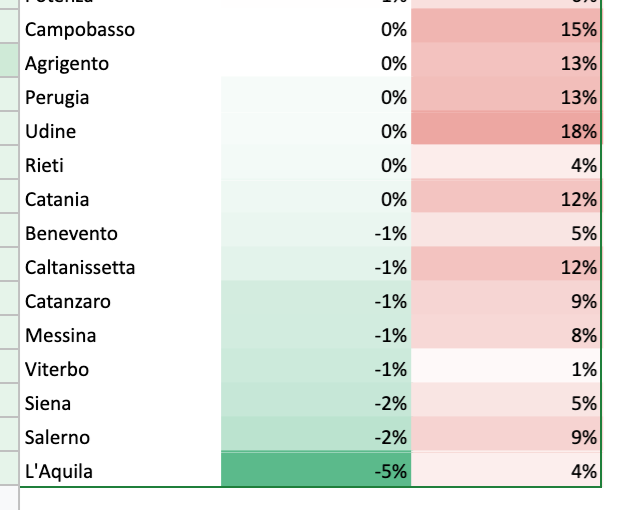EXCESS MORTALITY IN ITALY (NO SIGN OF NATURAL IMMUNITY BEING CLOSE)
There doesn't seem to be any major trend emerging from analyzing 2021 excess deaths against 2020 ones.
No clear sign of herd immunity nor harvest effect.
There doesn't seem to be any major trend emerging from analyzing 2021 excess deaths against 2020 ones.
No clear sign of herd immunity nor harvest effect.

These are the hardest-hit provinces.
The two hardest-hit ones have excess mortality back to baseline, but most other ones still have excess mortality.
Why don't I consider Bergamo province as an example of herd/natural immunity?
(answer next tweet)
The two hardest-hit ones have excess mortality back to baseline, but most other ones still have excess mortality.
Why don't I consider Bergamo province as an example of herd/natural immunity?
(answer next tweet)

Here is the scatterplot of all towns in Bergamo province (I excluded tiny ones with <10 yearly deaths during baseline years)
No clear trend
No clear trend

Here are the hardest-hit cities in Bergamo province. Again, I only see noise, no clear herd immunity trend.
For example, Pradalunga and Montello had 150% excess deaths in 2020 AND 30-34% excess deaths in 2021.
For example, Pradalunga and Montello had 150% excess deaths in 2020 AND 30-34% excess deaths in 2021.

These are the provinces with *negative* excess mortality in 2020 (a clue that perhaps lockdowns save more people than they kill).
Again, no clear trend (my hypothesis: lack of natural immunity is offset by lower virus circulation)
Again, no clear trend (my hypothesis: lack of natural immunity is offset by lower virus circulation)

The data is public from ISTAT website istat.it/it/archivio/24…; for the moment it only considers Jan-Oct 2021, so for all computations above I only considered Jan-Oct (across baseline, 2020, and 2021).
You're encouraged to play with it and see if you reach different conclusions.
You're encouraged to play with it and see if you reach different conclusions.
To summarize:
- no sign of herd immunity being close yet
- no sign of lockdowns killing more people than they save
- herd immunity / natural immunity peddlers should explain Italian data or seriously second-guess their conclusions
- no sign of herd immunity being close yet
- no sign of lockdowns killing more people than they save
- herd immunity / natural immunity peddlers should explain Italian data or seriously second-guess their conclusions
• • •
Missing some Tweet in this thread? You can try to
force a refresh









